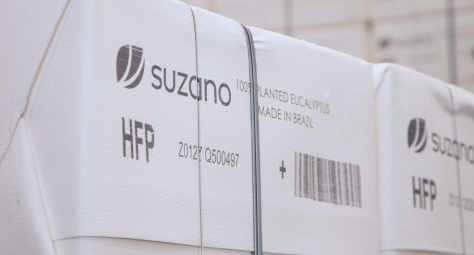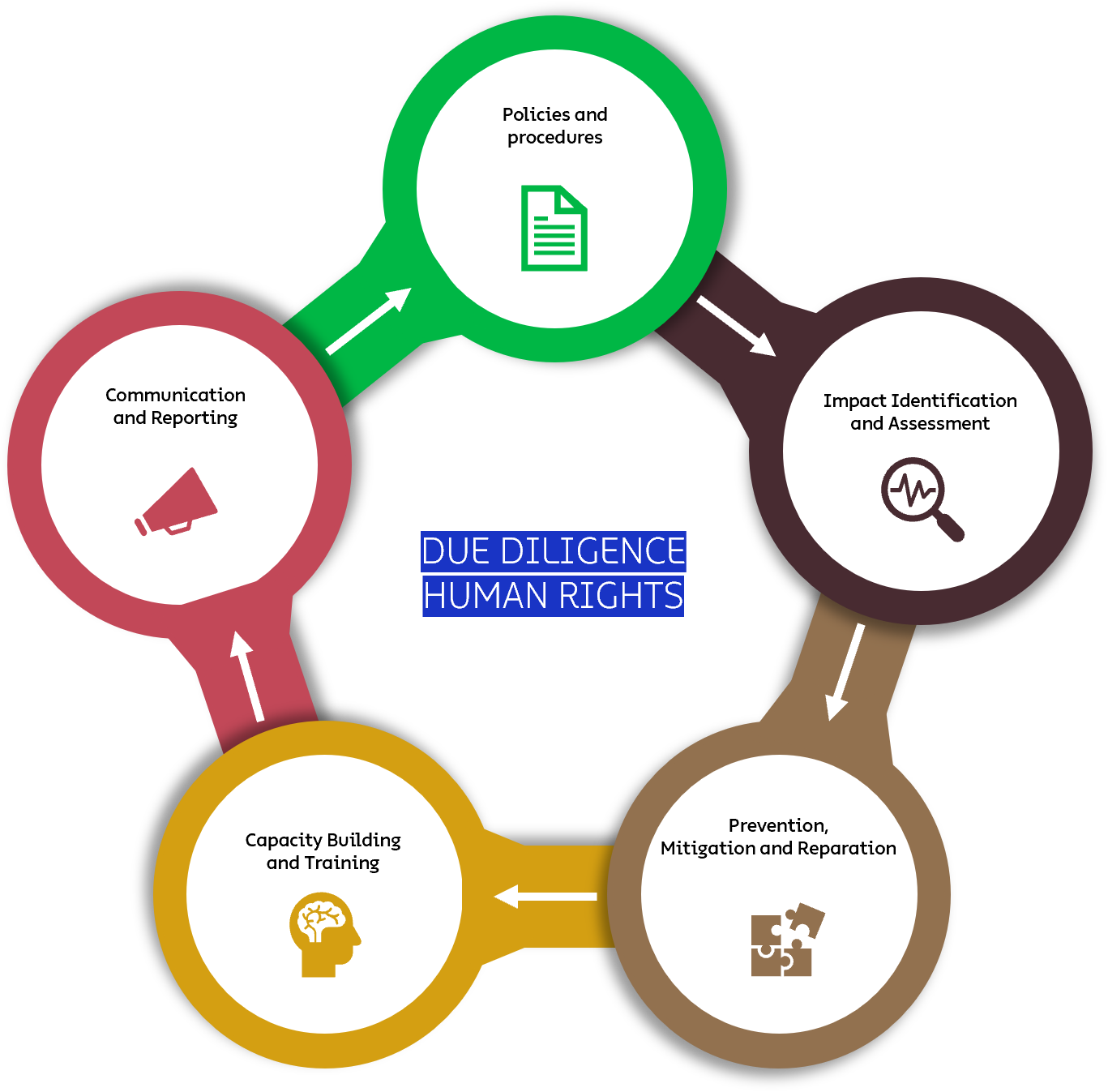sobre o que você deseja falar?


perguntas, sugestões ou problemas técnicos envolvendo a plataforma

informações sobre a empresa



SASB Dimension
Rights of Indigenous PeoplesSASB Code
RR-FM-210a.2SASB Sector
Forest ManagementGRI Dimension
General DisclosuresGRI Dimension
Material TopicsGRI Code
2-23GRI Code
2-25GRI Code
3-3GRI Code
2-24Suzano is committed to respecting human rights in all its activities, operational routines, and its value chain. We recognize that we are responsible for respecting the civil, political, economic, social, cultural, collective, development, peace, and ecologically balanced environment rights of all the people with whom we interact and/or who are impacted by our activity.
To this end, we have made efforts to integrate human rights risk management into our routines and have taken actions to prevent, mitigate, and remedy adverse impacts under the terms of the United Nations (UN) Guiding Principles on Business and Human Rights.
As a member of the UN Global Compact, Suzano undertakes to support and respect the protection of internationally recognized human rights, ensuring that it does not participate in violations of these rights. Our commitments are based on current and emerging regulations and international standards and references, such as the International Bill of Human Rights of the UN Assembly, the Declaration of the International Labor Organization (ILO) on Fundamental Principles and Rights at Work and its eight Fundamental Conventions, as well as other documents globally considered to be a reference in dealing with this issue, such as ILO Convention 169 on Indigenous and Tribal Peoples, the Voluntary Principles on Human Rights and Security (VPSHR), the Guidelines for Multinational Enterprises of the Organization for Economic Cooperation and Development (OECD) and, more recently, the Corporate Sustainability Due Diligence Directive (CSDDD) and the European Union Regulation on Deforestation-Free Products (EUDR).
As a fundamental premise, we guarantee compliance with applicable national and international regulations in all the countries where we operate. We are also committed to adopting the best practices that underpin the company's structure, with an internal team dedicated exclusively to human rights issues.
Additionally, Suzano is committed to actions to promote human rights, seeking to expand the positive impacts resulting from its operations and to be a protagonist in the transformation of its value chain and society.
1. Corporate Human Rights Policy
Suzano is committed to respecting and promoting human rights in all its operations and therefore has a Corporate Human Rights Policy. Originally developed in 2020 and revised in 2022, the Policy reflects our values and our responsibility to society.
It also presents the human rights most at risk of being negatively impacted by our activities, identified through a human rights risk assessment developed by external experts in this area and in consultation with internal experts.
Among the human rights risks highlighted are guaranteeing decent working conditions for our employees and in the value chain; combating child labor, forced labor, or human trafficking; preserving the rights of Indigenous peoples and traditional communities; respecting the rights of communities and human rights defenders, health and a healthy environment and ecosystem services; property security; the right to land; and the rights of communities in the value chain.
The Policy and its updates were approved by the Executive Board. The document is available in the main languages of the countries in which Suzano operates, and the commitments apply to all operations, leaders, employees, and outsourced workers in Brazil and abroad. We expect all the company's partners to respect human rights in their business and to follow the principles and guidelines of this policy.
2. Voluntary commitments, forums and partnerships
To demonstrate our commitment to sustainability and human rights, in 2024, during the Sustainable Development Goals (SDGs) in Brazil event in New York, we signed a strategic partnership with the Global Compact (Brazil Network) and the ILO. Together, we are implementing a comprehensive human rights due diligence program throughout our value chain, to strengthen our practices and contribute to the development of a more sustainable and responsible forestry sector.
Moreover, with the leadership of Suzano and partners from the forestry sector, such as the Brazilian Tree Industry (Ibá), the creation of a Forestry Working Group (WG) within Global Compact Brazil was launched, to establish a sector pact that promotes social sustainability and decent work in the forestry chain, in line with the new European regulations. The Forestry WG was launched at the UN headquarters in Geneva during the 13th United Nations Forum on Business and Human Rights.
Additionally, with implementation scheduled to begin in 2025, we have adopted the Nossa Voz (Our Voice) pilot project, which is the first sectoral mechanism designed to capture complaints related to human rights in the forestry sector. Besides providing a secure and accessible channel, Nossa Voz seeks to establish a replicable model to support risk management and breach remediation throughout the value chain.
Suzano is engaged in various initiatives and partnerships that reinforce its commitment to equity and human rights, including its participation in the Global Compact's Human Rights Action Platform, the Social CT of the Brazilian Business Council for Sustainable Development (CEBDS), the LGBTI+ Business and Rights Forum, the Business Initiative for Racial Equality, the Equity is a Priority program, the Women's 360 Movement and the Women's Forestry Network.
Through a partnership with Childhood Brasil, the company promoted campaigns and training aimed at internal and external audiences, connecting with the Municipal Councils for the Rights of Children and Adolescents in ten partner municipalities. This initiative is monitored through the "Suzano Social Programs" indicator.
We also took part in the 18th Annual Na Mão Certa (On the Right Track) Meeting “Communities on the Right Track”, a collective space for learning and sharing good practices aimed at tackling sexual violence against children and adolescents on Brazilian highways. In 2024, Suzano received a certificate for joining and complying with the Business Pact against the Sexual Exploitation of Children and Adolescents on Brazilian Highways. The event celebrated 25 years of Childhood and 18 years of the Na Mão Certa Program (NMCP) and recognized Suzano as a gold sponsor of the program.
3. Human rights governance
By 2024, Suzano had set itself the goal of implementing human rights governance to guarantee the integrity of its operations and the protection of the rights of all stakeholders. This governance was developed in 2024 and reflects our commitment to sustainability and international best practices.
A specialized team dedicated full-time to Suzano's human rights strategy and commitments was established in the Sustainability, Research, and Innovation vice-presidency and the Social Development team. At the same time, this governance is responsible for connecting more than 16 areas of the company and ensuring that actions related to the topic are transversal, in line with regulatory requirements and the commitments made by the company.
Specific monitoring tools will be developed to measure the effectiveness of actions and identify gaps in management processes. This approach allows Suzano to adapt its strategies dynamically and ensure that its human rights efforts are constantly evolving.
Finally, the main objectives of the governance structure are to strengthen the integration of Suzano's areas, the strategic alignment of operations with international legislation, the continuous improvement of internal processes to ensure compliance with current regulations, the mitigation of risks, and the expansion of positive impacts in the value chain. This approach seeks to promote an environment in which sustainability and human rights are fundamental elements in organizational culture and corporate practices.
In 2024, 16 male and female employees adhered to variable remuneration targets for 2025 linked to the improvement and implementation of human rights due diligence processes at Suzano and regulatory compliance, which demonstrates the company's commitment to transforming its targets into concrete actions and guaranteeing the inclusion of human rights in the different processes of the value chain.

4. Human rights due diligence and evaluation process
To fulfill its responsibility to respect human rights, including those specific to the sector, Suzano has continuously improved its due diligence process, operationalized through a comprehensive management system aimed at preventing human rights risks from materializing. It includes a Human Rights Policy, a systematic impact management process, a complaints mechanism and an integrated monitoring system.
Thus, our objective is to establish processes and a management model to identify, evaluate, and classify the impacts on human rights resulting from Suzano's activities, adopting the mitigation hierarchy to prevent, mitigate, repair, and/or remedy adverse impacts through management practices, socio-environmental investments, and continuous control actions, which must be incorporated into the operating procedures of the company's management system.

In this context, to ensure continuity and assertiveness in the evolution of the human rights agenda and considering the flows of the strategy for the implementation of due diligence, Suzano operates on five fronts focused on the prevention, mitigation, remediation and reparation of adverse human rights aspects and impacts, built on the UN Guiding Principles on Business and Human Rights:
In 2022, we began our human rights due diligence and, through a specialized consultancy, we mapped the risks of our activities and value chain in this area. In 2024, also with the support of a specialized consultancy, we evaluated updating our actions and planning in light of new human rights legislation, such as the Corporate Sustainability Due Diligence Directive (CSDDD). As a result, we reviewed our practices, our processes, and our governance to better integrate the human rights lens into our process, which culminated in a strategy in this area and 160 action plans, to guide Suzano and its value chain for the short (2025), medium (from 2026 to 2027) and long term (from 2028 to 2030).
The structure of the socio-environmental impact matrix is one of the central pillars of this process. Updated annually and developed by multidisciplinary groups, the Social Aspects and Impacts Matrix considers eight qualitative and quantitative criteria to identify, evaluate, and prioritize impacts. This process was revised in 2024 to incorporate specific human rights methods and frameworks in line with international best practices.
This work is also fed by stakeholder engagement mechanisms, including specific monitoring and programs such as the Operational Dialogue/Personal Agenda for the community, as well as a continuous evaluation and engagement program with suppliers, workers, and employees. The processes include tools such as the relationship management system, known as the “Relacione+” Stakeholder System, which enables feedback on the identification and evaluation flow for the composition of the matrix, and Suzano Responde, for dialog with the general public.
Moreover, the company's Ombudsman ensures confidentiality and non-retaliation in reported cases, while the Operational Dialogue methodology anticipates social and environmental risks in forestry, industrial, and port operations. This approach seeks to ensure constant feedback from the matrix. Based on this flow, we promote actions to prevent, mitigate, correct, and/or repair adverse impacts on human rights, as well as enhance the beneficial effects for society.
To prevent, mitigate, and/or repair real and potential impacts caused by its operations, Suzano determines in its Social Aspects and Impacts Matrix measures that are equivalent to the proportion of the impacts, to promote appropriate recommendations and actions for carrying out activities, in addition to subsidizing materiality in decision-making.
It is important to note that our operations are assessed annually by independent external auditors about the requirements of forestry certifications, which also address issues relevant to our forestry activities linked to human rights and the ILO Fundamental Principles. Find out more in the indicator “Total number and percentage of suppliers that have undergone environmental and social assessment”.
Beyond the mandatory training for all employees on human rights expressed in the Code of Ethics and Conduct, in 2024 158 people from the business were trained specifically on the human rights due diligence process and new regulations on the subject.
Find out more in the indicators ”Total number of training hours and total number and percentage of employees trained in human rights policies and practices” and “Security team trained in human rights policies or procedures, by type of operation”.
4.1. Dialogue channels and complaints mechanisms
Suzano values transparency in its relations with its various stakeholders and, for this reason, adopts a structured process for receiving, evaluating, responding to, and monitoring complaints related to its activities and products. These manifestations, which include complaints, doubts, suggestions, and opinions, can be sent through the call center or by e-mail to suzanoresponde@suzano.com.br.
For internal and external audiences, we have a Complaints Channel, which guarantees confidentiality and confidential treatment for any issue raised, including human rights-related complaints. This tool also covers cases of violation of the Code of Ethics and Conduct, the Corporate Human Rights Policy, the Anti-Corruption Policy, the Public Information Security Policy, and the Diversity and Inclusion Policy. Complaints can be made by calling 0800 771 4060, emailing suzano@denuncias.contatoseguro.com.br, using the Contato Seguro app, or through the ombudsman portal, which reaches all the regions where the company operates.
Complaints are managed through a computerized system run by partner companies. Once the complaint has been received, a 30-day investigation process begins. The results are analyzed by a Conduct Subcommittee which evaluates the corrective measures and action plans, reporting back to the Conduct Committee.
Among the main categories of complaints received are inappropriate behavior, fraud, working conditions, labor issues, health and safety, and information security. After investigation, the actions may include warnings, suspensions, or dismissals. Find out more in “Code of Ethics and Conduct Management”.
Suzano also has various dialogue mechanisms that feedback into its analysis of human rights impacts and risks:
Through Relacione+, all contacts and negotiations related to repairing losses and damages resulting from Suzano's activities are recorded, reinforcing the company's responsibility to protect human rights and assist affected communities.
We are against any kind of reprisal against any people or groups who raise concerns about actual or potential adverse human rights impacts. We want an environment in which the holders of these rights feel safe to raise their concerns with company representatives.
4.2. Key human rights issues
In Suzano's strategy, and in addition to the result of human rights due diligence and risk mapping processes, we have listed our salient issues, which have become topics of greater commitment in the establishment and implementation of measures to mitigate adverse impacts in this area.
Suzano is committed to following the mitigation hierarchy to cease, minimize, repair and remedy adverse impacts. This commitment includes taking proactive action, ensuring fair and balanced solutions, prioritizing consensus, and consulting conciliation bodies if necessary.
Along with recognizing that our operations and value chain may contain risks related to human rights, we seek to be an agent of positive transformation. To this end, the company has implemented initiatives that directly contribute to reducing poverty, boosting education, promoting diversity, equity and inclusion, combating the climate crisis, ecological balance, and biodiversity conservation, among other aspects.
Furthermore, Suzano maintains community engagement programs, internal training and training for partners, management processes and documents that address the issue of human rights, and public reports, such as the sustainability report, among other measures - many of them linked to the salient issues identified and seeking to promote the shared value and reinforce the commitment to data transparency and the protection and promotion of human rights.
Our integrated highlights are presented below¹:
Decent work
We respect the labor rights defined by the ILO Conventions and have established a commitment to providing a decent, fair, and safe working environment for Suzano's employees, contractors, and service providers, complying with the regulations and conventional collective standards and the guidelines established in its Code of Ethics and Conduct. The theme includes combating forced labor, human trafficking, and child labor.
Concerning labor and union relations and freedom of association and collective bargaining, there is a commitment to maintain respectful relations with employee representatives and to comply with the agreements reached, always disclosing them to all employees. In this sense, it is the responsibility of all managers to be dedicated to the company's governance with their teams, receiving support and guidance from the Legal and People Management areas.
Suzano promotes diversity, equity, and inclusion, without discrimination of any kind, race, color, political conviction, gender identity, religion, sexual orientation, age, place of birth, and disability, among other aspects.
We demand that our suppliers make the same commitments to their workers. We map the human rights risks in our chain, assess all suppliers about these risks and monitor high-risk suppliers. We have also established engagement programs and initiatives that seek to influence suppliers and promote improvements in their processes and worker management structures.
Find out more at “Occupational Health and Safety Management” and “Labor Relations Management”.
Climate change, just transition, and nature
Understanding that a fair and equitable transition to a low-carbon economy requires a close look at people and communities, especially the most vulnerable, Suzano has adopted a social development strategy in the areas surrounding the company's operations. We have consolidated our decarbonization strategy, which outlines the journey to mitigate emissions, following international frameworks. Find out more at “Suzano Social Programs” and “Climate change at Suzano”.
We recognize the interdependence between the themes of nature, carbon, and human rights, and have therefore adopted good practices in protecting biodiversity, improving our knowledge of impact and dependence on nature and ecosystem services, reducing water abstraction, and increasing water availability in watersheds considered critical in our areas of operation.
Indigenous peoples, quilombolas, local and traditional communities
The relationship process with neighboring communities has two main purposes: to maintain Suzano's social license to operate and to strengthen territorial development. To achieve these objectives, it is essential to ensure constant and transparent communication with local associations and cooperatives, NGOs, isolated neighbors, unions, municipalities, states, and other companies, maintaining a positive perception of Suzano in the territory.
The company monitors the beneficial and adverse social impacts of its activities on the communities surrounding its operations and implements the most appropriate mitigation measures in each case. The purpose of Suzano's social monitoring and evaluation plan is to assess the efficiency and effectiveness of the social and environmental relationship and investment strategies adopted, as well as to monitor and evaluate the processes and actions to minimize the social risks associated with the company's operations (impacts and demands).
We respect and promote human rights related to local, Indigenous, and traditional communities located in the areas of influence of Suzano's operations, following the implementation of the strategy of the Social Relations area, in a culturally appropriate, permanent manner, based on trust and mutual respect of rights and interests, under the principles established by internal procedures and policies that provide for economic, environmental and socio-cultural rights and interests. These are the internal procedures and policies:
Suzano undertakes to take the initiative to repair the damage, not waiting for the injured party to complain, and to guarantee the affected party the freedom to choose possible solutions. For further information check “Engagement mechanisms” and “Occurrence management”.
In 2024, a working group was established specifically to meet the requirements of new regulations that address this issue, promoting advances in the integration of human rights with corporate strategies. At the same time, we have developed a nature strategy, aligned with the framework of the Taskforce on Nature-related Financial Disclosures (TNFD), which covers human rights related to indigenous and traditional peoples.
We have also adopted management systems, engagement processes, and certifications aimed at preventing and mitigating adverse operational impacts on local communities.
Supply chain
Due to Suzano's forestry operations, the supply chain is spread over a large territory, with contacts with local communities. Wood suppliers and other stakeholders in this chain are monitored through regular audits, forestry certifications such as FSC-STD-40-004 and Cerflor NBR 14.790, as well as contractual clauses that reflect the company's sustainability commitments.
The FSC-STD-40-005 standard, applicable to the receipt of uncertified wood, known as "controlled wood", requires the implementation of a due diligence system to identify and mitigate risks, including issues related to human rights and impacts on vulnerable groups, preventing the receipt of materials from unacceptable sources.
The Sustainable Purchasing Policy incorporates human rights aspects, and the Supplier Code of Conduct defines clear expectations and standards for business partners, including explicit requirements on human rights and environmental compliance, consolidating Suzano's sustainability policy in its value chain.
The supplier categories are assessed about human rights and environmental risks. Potential suppliers carry out an initial self-assessment, followed by documentary and legal analysis to verify their eligibility based on legal compliance before their authorization to contract.
Depending on the risk and the activity to be carried out, the supplier may be assessed on health and safety issues and labor practices. Depending on the risk category, suppliers are assessed on specific human rights issues, using tools that seek to identify controversies and allegations of human rights impacts, and/or are assessed by an external audit carried out by a specialized company hired for this purpose. Find out more in the “Responsible supplier management” indicator.
Right to land
Suzano is committed to respecting the right to property, peaceful possession, and use of the land. As a guideline, the company carries out a due diligence process before any land negotiation, which includes a socio-environmental analysis.
In our forestry operations, we have established a Wood Supply Policy, which stipulates that our plantations are to be carried out exclusively in areas that have already been anthropized by other uses, the conversion of which has not occurred under our direct or indirect responsibility, to commit to a zero deforestation policy. In this context, our areas and wood suppliers are identified as relevant processes in the human rights agenda, and are included in the certification management that covers the entire supply chain.
Of the certifications applied, we highlight Forest Stewardship and Chain of Custody, implemented by forest certification programs such as the Programme for the Endorsement of Forest Certification (PEFC) (including the Cerflor NBR 14. 790) - which guarantees good management practices and responsible origin in environmental, social and ethical terms - and the Forest Stewardship Council® (FSC®, including the FSC-STD-40-005 Standard), a certification that covers forestry activities, from verification of compliance with environmental, economic and social issues to product distribution through the chain of custody and responsible forest stewardship, regularization of ownership and the means adopted to avoid physical or economic resettlement or any other conflict over land.
In all standards, we implement and maintain a due diligence system to identify, among other issues, human rights risks.
Every year, we carry out internal audits to ensure compliance with the principles, indicators, and criteria of the certifications, promoting an environment of continuous improvement in our operations. Furthermore, we undergo external third-party audits, which allow us to demonstrate compliance with the established requirements and identify opportunities for improvement or correction of non-compliant steps. These processes include certifications, re-certifications and the maintenance of seals that demonstrate Suzano's commitment to the sustainability of its processes. Find out more in “Land use management”.
We follow the controversies and allegations involving the lands we operate and report our position on them.
Property security
Suzano recognizes that its security teams have frequent interaction with employees, contractors, and external stakeholders during the monitoring and protection of our native and planted forests, as well as industrial and commercial facilities throughout the territory in which we operate.
Our work is inspired by the Voluntary Principles for Human Rights and Security (VPHRS), which guide the proportionality of the use of force and respect for human rights. We respect the legislation of the countries where we operate, we provide specific training for this audience and we have established mechanisms to monitor the performance of our security professionals, including receiving complaints and claims about their performance.
Note: